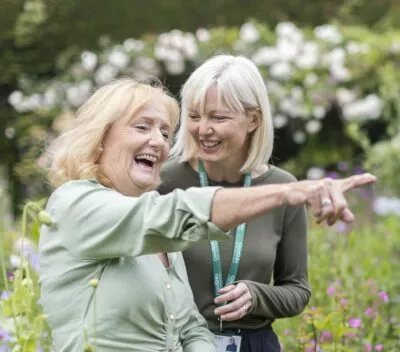Alleviate loneliness with companionship care
GoodOaks offers companionship as a service for people who wish to remain independent but sometimes find it difficult being alone. Sharing experiences and enabling you to make the most of being in the community you love.
Want to know more about our care services?
Find your local branch
Companionship care professionals offer peace of mind, reassuring individuals that there is back-up available if required. When needed, both visiting homecare and live-in care professionals can provide a range of support and companionship, allowing people to start loving being at home again.
Mary’s Case Study

Mary contacted GoodOaks because she was feeling unsafe being alone in her own home. She was undergoing tests to determine why she was feeling unwell, and concerns for her health made her feel anxious. She wanted somebody to be there, who would be able to help if needed.
Mary wanted a live-in care professional to stay with her for a few weeks until she got the medical attention that she required. After an initial care assessment, GoodOaks matched her with Jane, a live-in care professional experienced in supporting individuals facing similar situations. Jane prepared fresh meals for Mary and took her to hospital appointments and to visit friends.
Mary was prescribed medication to manage her health condition. With Jane’s support, she regained her strength and confidence, enabling her to live at home on her own again.
“I felt safe having someone else in the house. It allowed me to relax and concentrate on getting myself better.”
Find out more about homecare
Companionship care is for people who don’t necessarily need any help with their personal care, domestic duties or physical needs, but they are suffering from loneliness and need a companion to keep them company, talk to and play games. Companionship care provides access to socialisation and helps to relieve feelings of loneliness.
You can receive companion care as little or often as you like. We can provide weekly, daily or monthly visits and can also match you with a live-in care professional for a more permanent companion.
When we match you with a care professional, we want you to build a strong, trusting relationship. You’ll develop a bond together so we try our best to ensure you’ll always see the same companion care professional.
Our homecare expertise
With our help, clients are able to stay in familiar surroundings that they have spent their lives shaping. Our award-winning training and expertise enables care professionals and office teams to care for a range of conditions with skill, empathy and warmth.
Find my local branchPersonal care
Helping you stay independent and supporting your daily routines, including washing, dressing and medication administration.
After hospital care
Helping to get you back on your feet after a planned or unplanned stay in hospital.
After stroke care
Personalised stroke aftercare and support delivered in the comfort of your own home.
Respite care
Short-term support, with the same attention to detail and personalisation you’d expect from permanent care professionals.
Dementia homecare
Specialist dementia care provided with respect, empathy and warmth, in familiar surroundings.
Companionship
Sharing experiences and enabling you to make the most of being in the community you love.
Specialist care
Experienced care professionals that can support people with more complex care requirements.
Emergency homecare
With quick starts, GoodOaks’ responsive emergency homecare service can help keep a loved-one at home.
Learning and physical disabilities
Helping you live independently at home with personalised care based on your unique wishes and needs.








